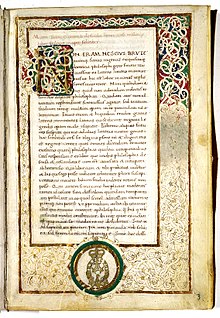De finibus bonorum et malorum
notability. (August 2023) ) |
 De finibus bonorum et malorum | |
| Author | Cicero |
|---|---|
| Country | Roman Republic |
| Language | Classical Latin |
| Subject | Ethics |
| Genre | Philosophy, Dialogue |
Publication date | 45 BCE |
| Preceded by | Academica |
De finibus bonorum et malorum ("On the ends of good and evil") is a
Cicero dedicated the book to Marcus Junius Brutus.
Contents
First and second books (Liber Primus and Liber Secundus)
The first two books are a dialogue set at Cicero's country home in
Third and fourth books (Liber Tertius and Liber Quartus)
In the next two books
Fifth book (Liber Quintus)
In the last book Cicero presents in the form of a dialogue between himself and several friends the theory of eudaimonia taught by Antiochus of Ascalon, which treats Aristotelianism as a subgroup of Platonism. This theory includes both virtue and external goods as the highest good. At the end of the book, Cicero criticized logical inconsistencies of this teaching, but more briefly and only addressing details, not broader principles. Cicero then declares that he follows this school of thought, albeit not without reservations, while respecting the valuable aspects of the teachings presented in the previous books.
Legacy
In
See also
Further reading
- Annas, Julia Elisabeth; Betegh, Gábor (2016). Cicero's "De finibus": philosophical approaches. Cambridge: Cambridge University Press. ISBN 9781107074835.
External links
- De finibus bonorum et malorum, Latin text
- De Finibus, English translation by Harris Rackham, LacusCurtius
- Side by Side Latin and English, transl. by Harris Rackham, Google Books
 On the Ends of Good and Evil, english translation by Harris Rackham public domain audiobook at LibriVox
On the Ends of Good and Evil, english translation by Harris Rackham public domain audiobook at LibriVox

